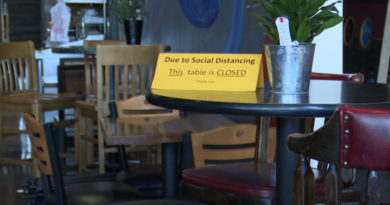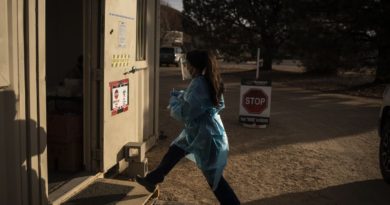Kremlin blames ‘nihilism’ as Moscow sees record COVID-19 infections
A specialist wearing personal protective equipment (PPE) sprays disinfectant while sanitizing the Rizhsky Railway Station, one of the measures to curb the spread of the coronavirus disease (COVID-19), in Moscow, Russia June 17, 2021. Moscow Division of Russian Emergencies Ministry/Handout via REUTERS
MOSCOW, June 18 (Reuters) – The Kremlin on Friday blamed a surge in COVID-19 cases on “nihilism” and reluctance to have vaccinations after a record 9,056 new infections in Moscow, mostly with the new Delta variant, fanned fears of a third wave.
Moscow Mayor Sergei Sobyanin extended restrictions he had imposed this month, which include a ban on public events with more than 1,000 people, an 11 p.m. closing time for cafes and restaurants, and the closure of fan zones set up for the European soccer championship. read more
Sobyanin said earlier this week that the situation in the capital, home to 13 million people, was deteriorating rapidly.
“According to the latest data, 89.3% of Muscovites (recently) diagnosed with COVID-19 have the mutated, so-called Delta or Indian variant,” the news agency TASS quoted Sobyanin as saying on state television.
Moscow’s new infections made up more than half the 17,262 reported across Russia, the world’s largest country.
Kremlin spokesman Dmitry Peskov said President Vladimir Putin was monitoring the situation closely.
Asked to explain the surge in cases, Peskov blamed the virus’s “cunning nature”, a reference to its mutations, as well as “total nihilism, and the low vaccination level”. read more
At a briefing, he rejected the idea, posited by some critics, that Russians were reluctant to have vaccinations because they distrusted the authorities.
As of June 2, the most recent tally available, only 18 million Russians had received at least one dose of vaccine people so far: at one-eighth of the population, that is far less that most Western countries.
Moscow authorities this week ordered all workers with public-facing roles to have a vaccination. read more
On Friday, the city government said only vaccinated residents would be able to receive non-emergency treatment in hospitals.
Sobyanin said on Friday he expected the city government to start the inoculation of migrant workers with Sputnik Light – a single dose of the Sputnik V vaccine – early next month.
But he also said it was “vitally important” to start administering further booster doses – in effect, a third dose. He said he himself had just received a top-up, after being fully vaccinated two doses a year ago.
He said the third doses being offered were a repeat of the first dose of the two-shot Sputnik V vaccine.
Several Russian officials and members of the business elite, as well as some members of the public, have already been securing third and fourth doses of Sputnik V, Reuters reported in April. read more
The question of how long a vaccine offers protection against COVID-19 will be vital as countries gauge when or whether revaccination will be needed, and Russia’s findings will be closely watched elsewhere.
Reporting by Gleb Stolyarov; Writing by Olzhas Auyezov; Editing by Maria Kiselyova
Our Standards: The Thomson Reuters Trust Principles.




